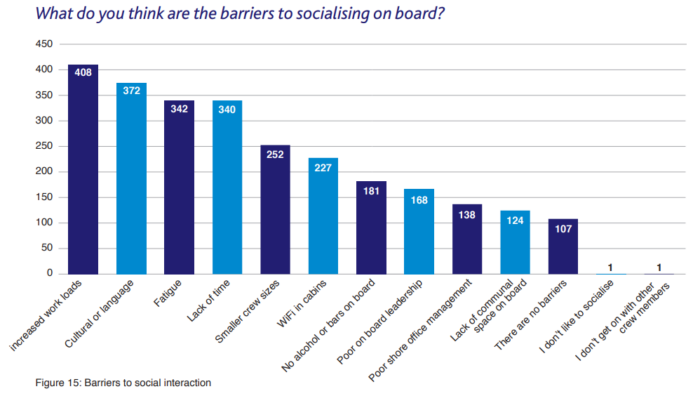SWAN conducted a research concerning the wellbeing for crew onboard and the challenges arising from isolation, highlighting the importance of social interaction and the key role it plays in seafarer's life.

Accordingly, the research called "Phase One of the Social Interaction Matters (SIM) Project identified or confirmed that social interaction can improve the mental and physical health and well-being of seafarers and demonstrated clear benefits for:
- developing trust and better working relations with other crew members (family away from home).
- developing team cohesion and improved resilience that can increase motivation and productivity at sea.
- improved safety practice.
- combatting isolation and providing a release from the daily work environment.
The research also identified areas that can negatively impact opportunities for bringing people together socially on board, including:
- fatigue, lack of time and increased workloads.
- shorter port calls and less shore leave.
- the effectiveness of the leadership and management skills on board and ashore.
The need for this project was recognized long before the widespread impact of the COVID-19 pandemic, but the consequential crew change crisis has placed even more importance on the need for strong crew cohesion.
| Key research findings
|
The research confirms that social life onboard matters and is of high importance.
Although the project continues, the report details many important takeaways for shipping companies and ship operators.
For example, the research shows that crew differences including nationality, gender and age should be considered in the planning of social activities as these factors can influence recreational preferences. It is therefore important for ship management to consider what engages and brings people together and adapt suitable activities to their own company requirements. The research provides numerous examples of such activities and these can be adapted to accommodate most vessel types, voyage patterns, nationalities, and time constraints. Ensuring that crew engage socially, even for small amounts of time every day, is vital and should be a priority on every voyage, however long.
Dr Kate Pike, research lead and author of the report stated that
Although measures can be put in place to facilitate recreational gatherings on board, it is these fundamental issues that need to be addressed for a long-term impact to take effect. Social interaction on board has a unifying impact that promotes a happier, more motivated crew that can work more effectively and safely together.
Source: https://safety4sea.com
